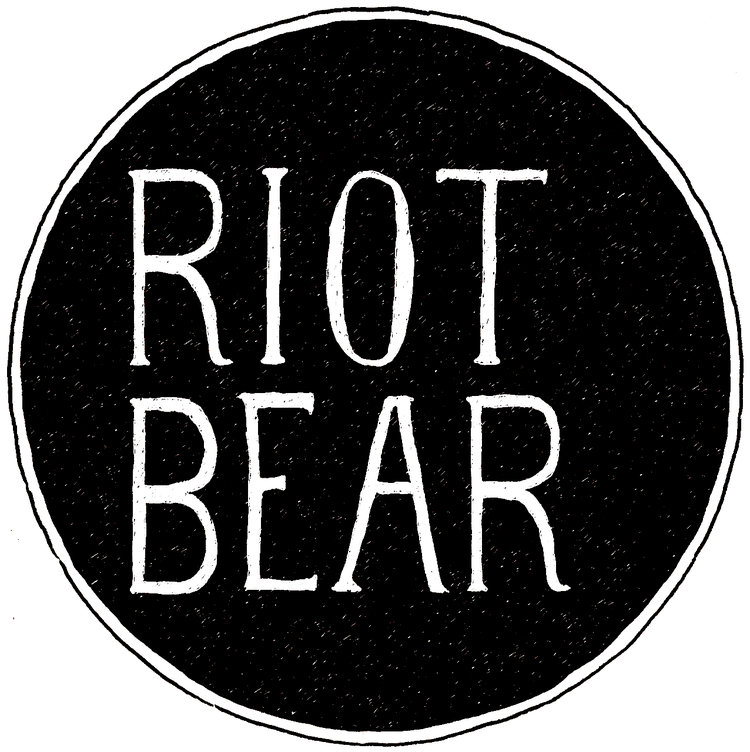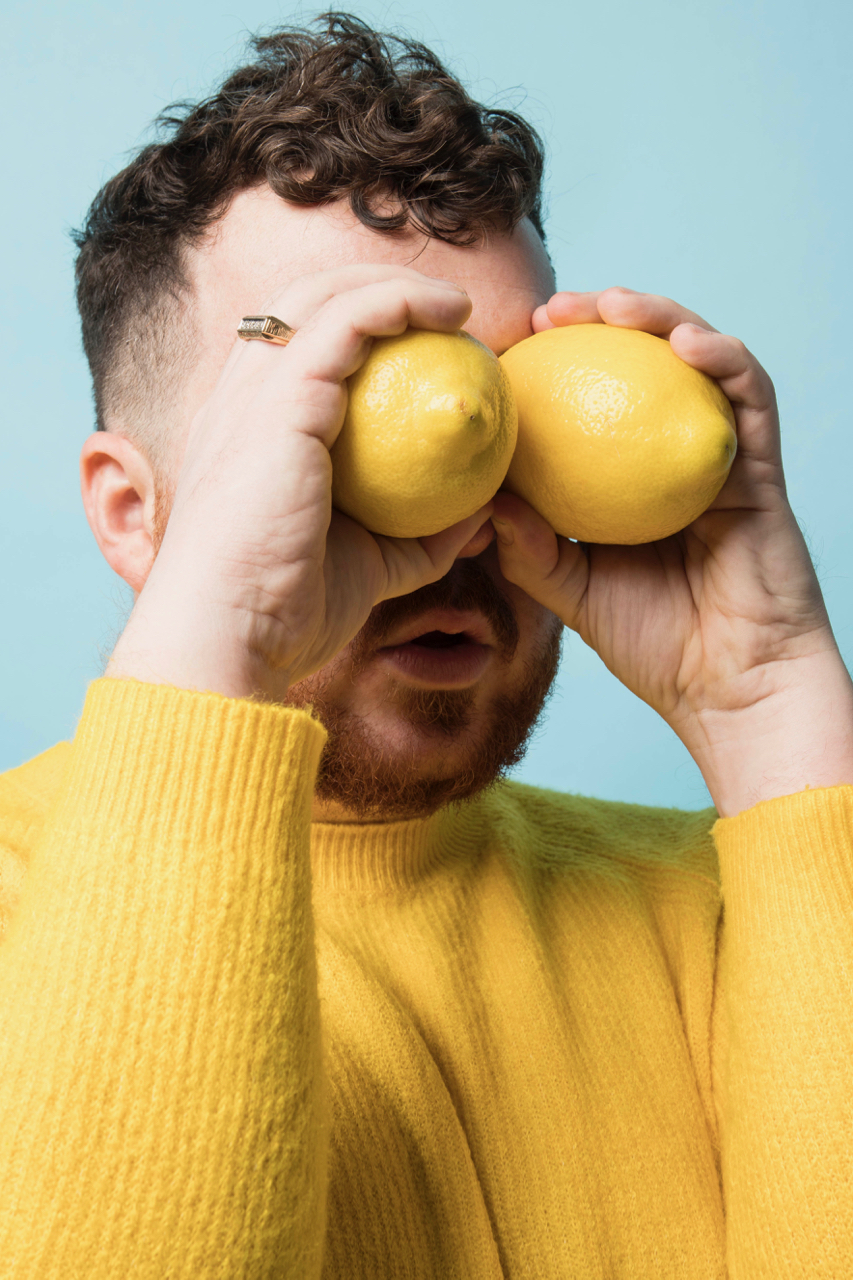FASHION / Fruit Flavor
Scottee shot by Paul Perelka styled by Natasha Aimée in London, England
How was growing up in the UK for you?
Difficult and loving. Most people assume growing up in a capital city would be a ball -- access to culture, ‘London cool’ and queerness. However, I was born into a newly settled Irish migrant family and placed in sub standard social housing in a poor neighbourhood of North London. As I result I’ve explored what growing up in these conditions, surrounded by cis men and their bravado, addition, poverty and violence has done to a whole generation of folk like me in my theatre work.
On the flip side, being the outsider has given me freedoms that aren’t afforded to those who assimilate or fit in -- I’ve been able to find my gang, to embrace being a fat queer weirdo and question the world whilst doing so -- it’s just a shame I had to have my head kicked in along the way.
How does the social class system in England factor into queer identity?
Queerness in the UK is just as classed as mainstream cultures. There are very few identifiable, forward facing working class queers who I might be able to call a role model.
Queer culture in the UK is dominated, narrated and curated by those who grew up with art in their homes, whose parents could afford for them to study queer theory at university. It’s led by those who were allowed to stretch their legs from a younger age and so have developed their personal and political identity quicker than the rest of us. Therefore, they are ready and setting the agenda before kids from my background.
There is an uncomfortable co-opting of working classness by queer artists in the UK that is yet to be called out -- using class as an aesthetic, a denial that class exists or because they now live a ‘bohemian’ life with little money believe they too are now able to identify with working classness.
When did you first sense your queerness?
I think you’re always queer, it just depends how long it takes for you to get to it. I’ve always been the outsider, I’ve always been the kid crying when no one turned up to their party, the bullied one, the reject. I think this isolation or what some people call ‘trauma’ is often really formative for many queers and their identity.
I think I consciously became aware of my queerness when I was around 18/19. I was with my husband queuing up to get into a 24 hour cafe in Soho, London’s then gay quarter. A bunch of white gay cis blokes started to mock me because I’m fat, femme and to them I dressed weird. My heart sunk, I began to cry, the queue laughed and my husband put the ringleader up against the glass window and told him to shut the fuck up.
The more courage I gained the more white gay men tried to belittle me -- I’ve had drinks thrown over me, been removed from nightclubs because the way I was dressed, in fact someone once tried to set me on fire.
However, I soon found my people -- the queer dykes who took me under their wing, into their pubs, living rooms DIY spaces and gave me the space to be who I was. I’m so grateful for the women, femmes and dykes in the community -- their contribution and even presence often goes unnoticed as many gay men think male privilege doesn’t apply to them and gay misogyny isn’t a thing.
Where does art end and activism begin? Is there a distinction for you?
I dunno. I don’t think my brain is able to decipher academic concepts in that way. I never went to university, in fact the last day I went to school I was 13. I’m sort of making my activism (if at all it is that) and art (if at all it is that) up as I go along from gut instinct.
I’m not sure a distinction is important to me either -- I’m never bothered if people see what I do as having activist or art capital. What is important to me is that it gets the brain going, that it might help us start to make more room for each other or see each others experience, or make us more empathetic, loving and able to focus on the bigger picture.
We interviewed you about 10 years ago for the first incarnation of Riot Bear. What are the greatest lessons you learned in the past decade?
In that decade I think I’ve learned how to listen which I think has meant my work has gotten better.
This year I celebrate 10 years of making work and so I’m revisiting a lot of what I’ve made in that time for an archive publication that will be released in September in collaboration with Live Art Development Agency and Professor Jen Harvie. Looking back I’ve realised how I’ve had to learn on the job and so getting a door opened has taken a long time. In response, I’ve set up a mentoring scheme for working class and/or queer artists across the UK as well as establishing the Working Class Artists Group. Perhaps what I’ve learnt is how scary and lonely its been trying to find my voice and I want others to feel like they have someone or something to turn to.
Would you say that you’re more comfortable in your body now?
At 22 I think I was worried about what the world thought about my body, conscious if I was taking up too much room, if I was attractive enough for the gays or failing at hairy enough for the bears.
Now at 32 I couldn’t give a fuck if you don’t sit next to me on the tube. I couldn’t care less if you think I’m too fat, faggy or femme. Similarly, I’m not worried if the #gaybear instagram community think I’m too fat, not fat enough or confused by why I’m not wearing a plaid shirt.
I now know I’m really fucking hot ...and a double tap from you does not validate my beauty, queerness or existence.
Check out more on Scottee and the celebration of his body at Fat Blokes.
t-shirt by Monki / track suit by ASOS Curve, handbag by ASOS Design / sunglasses by Super by Retrosuperfuture, hoody by Monki, vintage jeans, socks by Uniqlo / sunglasses by Super by Retrosuperfuture, sweatshirt by ASOS / sweater by Monki / Jacket by ASOS, sweatshirt by Cockheart / vintage jeans, vintage jacket, t-shirt by ASOS / sunglasses by Super by Retrosuperfuture, sweatshirt by ASOS








